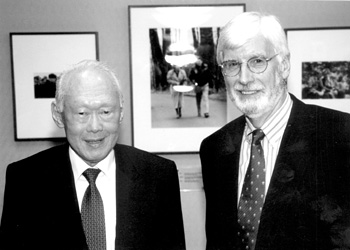Lee Fellowship: A commitment to public service

In September 2001, about 18 senior public officials from Southeast Asia and China will exchange the summerlike days of Singapore for seven weeks of autumn at the Kennedy School of Government (KSG), and one week in Washington, D.C.
These officials are the members of the first class in the new master in public management (MPM) program at the National University of Singapore (NUS); and they will be the first recipients of the Lee Kuan Yew (LKY) Fellowship, which recognizes MPM candidates who have demonstrated leadership and commitment to public service. The candidates are chosen for their potential to contribute to the growth of the program through their experience and perspectives in policymaking and public management; and to benefit their organizations and their countries by the lessons learned from their year of study.
Joseph S. Nye, Dean of the Kennedy School, officially announced the fellowship on Oct. 17, at a dinner honoring Singapore’s former prime minister and now senior minister, Lee Kuan Yew, who was visiting the School. Dean Nye said, “We are proud of our close relations with NUS and proud to have these fellowships for Southeast Asians named after Lee Kuan Yew.”
“The Kennedy School has, for some time, had a vision of building a mutually reinforcing network with other schools of public policy around the world,” said John W. Thomas, the faculty chair of the Kennedy School’s Singapore Program. “The Lee Kuan Yew Fellowships will bring Asian leaders into the mainstream of our School, and will establish a model of international education for public leadership which we hope will expand to include similar fellows from other parts of the world.
“[Singapore] is a unique place to study public policy and management. Because of the strength of their policies and institutions Singapore dealt with the Asian financial crisis much better than their neighbors and there is much that Asia can learn from them.”
For the LKY Fellows, the first part of the MPM Program, which starts in January 2001, will consist of courses at NUS in economics, ethics, leadership, and public management (the latter will be taught by KSG Professor Frank Hartmann). Then they will move from classroom to practice by a two-month attachment to a Singaporean Ministry or an agency, where they will focus on a specific policy issue, and prepare an analytic paper to be presented to other fellows and faculty at the conclusion of the attachment.
Then at KSG in the fall, they will enroll in a core module especially designed for them – but open to other students – and in three other elective modules. Before returning to NUS in mid-November to complete the program, the fellows will travel to Washington, D.C., to observe U.S. government and international agencies in action.
The KSG-NUS collaboration to develop and implement the MPM Program, and to bring the Lee Kuan Yew Fellows to the School, is part of a larger relationship. In April 1999, the School signed an agreement with NUS to provide support and assistance in strengthening their Public Policy Program, which includes a master in public policy program and nondegree executive programs, some of which have been run collaboratively with the Kennedy School.
The connection with NUS provides the Kennedy School with an Asian partner and location to run executive programs in negotiations, in leadership, and in infrastructure. Professor José Gomez Ibañez, who co-chairs the “Infrastructure in a ‘Market Economy’” program, along with Professor Henry Lee, commented that the collaboration with NUS had provided that program the opportunity to extend its reach and perspective.
“Future Asian leaders need to understand the world and not just Asia,” said Professor Ong Jin Hui, director of NUS’s Public Policy Program. He praised the harmonious and productive collaboration between KSG and NUS, and the international perspective that KSG offers. “For the LKY Fellows, the period of study at the Kennedy School will provide a unique opportunity to strengthen that perspective.”




